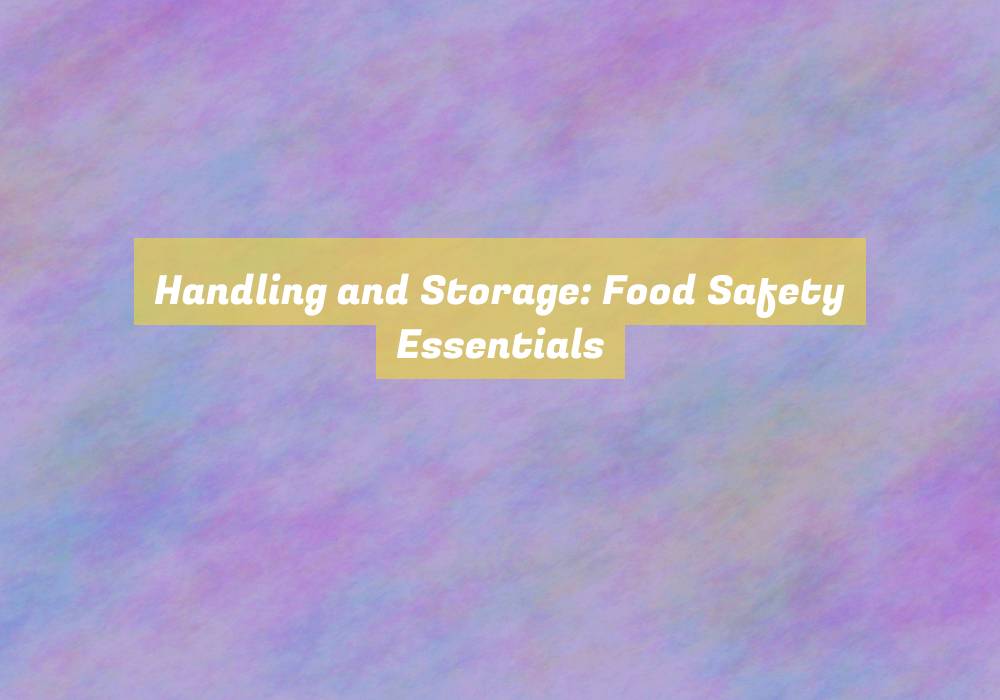Handling and Storage: Food Safety Essentials
So you think you know everything about handling and storing food safely? Think again. The reality is, thereG??s a lot more to it than you might realize.
From understanding the importance of proper handling to mastering the best practices for food storage, thereG??s a whole world of essential knowledge that can make all the difference in keeping your food safe and your meals enjoyable.
Whether youG??re a seasoned chef or a novice cook, thereG??s always something new to learn when it comes to ensuring the safety of the food you prepare and consume.
Importance of Proper Handling
Proper handling of food is essential to prevent contamination and ensure the safety of consumers. When you handle food, itG??s crucial to maintain cleanliness and hygiene. Wash your hands thoroughly with soap and water before and after handling food to prevent the spread of bacteria and viruses.
Additionally, make sure to clean and sanitize all surfaces and utensils that come into contact with food to avoid cross-contamination.
Another important aspect of proper food handling is to store different types of food separately. Raw meat, poultry, and seafood should be stored separately from ready-to-eat foods to prevent the spread of harmful bacteria.
When youG??re preparing meals, use separate cutting boards and utensils for raw and cooked foods to avoid cross-contamination.
Furthermore, itG??s essential to cook food to the proper internal temperature to kill any harmful bacteria. Use a food thermometer to ensure that meat, poultry, and seafood are cooked to the recommended temperature.
Best Practices for Food Storage
To ensure food safety, itG??s important to store food properly, following specific guidelines for different types of food products.
When storing perishable items such as meat, poultry, and seafood, itG??s crucial to keep them refrigerated at temperatures below 40-?F (4-?C) to prevent bacterial growth. Additionally, these items should be stored separately from ready-to-eat foods to avoid cross-contamination.
For fruits and vegetables, itG??s best to store them in the crisper drawer of the refrigerator or in a cool, dark pantry to maintain freshness.
Dry goods like flour, rice, and pasta should be stored in airtight containers in a cool, dry place to prevent moisture and pest infestation.
Moreover, canned goods should be kept in a cool, dry place, away from direct sunlight and extreme temperatures. ItG??s important to regularly check expiration dates and properly rotate food items to ensure that older products are used first.
Understanding Food Spoilage
Understanding food spoilage is crucial for maintaining food safety and preventing the consumption of contaminated or expired food products. Spoilage occurs when food deteriorates to the point of being unfit for consumption. It can happen due to various factors such as microbial activity, enzymatic reactions, or physical and chemical changes.
Recognizing the signs of food spoilage is essential. Look for changes in color, texture, odor, and taste. Mold growth, off-putting smells, slimy textures, and discoloration are common indicators of spoilage. When you detect any of these signs, itG??s important to discard the food to avoid the risk of foodborne illness.
Understanding the causes of food spoilage is also vital. Microorganisms like bacteria, yeast, and mold are major culprits. They thrive in favorable conditions such as moisture, warmth, and nutrients present in food. Enzymes naturally present in food can also lead to spoilage if not properly controlled. Additionally, factors like oxygen exposure, light, and pH levels can contribute to food deterioration.
Tips for Safe Food Handling
Recognize the signs of food spoilage and then implement safe food handling practices to minimize the risk of contamination and ensure the safety of your food.
When handling food, always wash your hands with soap and water before and after touching raw meat, poultry, seafood, or eggs. Use separate cutting boards and utensils for raw meat and ready-to-eat foods to avoid cross-contamination.
Keep hot foods hot (at 140-?F or above) and cold foods cold (at 40-?F or below) to prevent bacterial growth. Refrigerate perishable foods within two hours, and if the temperature is above 90-?F, refrigerate within one hour. Thaw frozen foods in the refrigerator, under cold running water, or in the microwave, never on the counter.
When marinating food, do so in the refrigerator, not on the counter. Cook food to the safe internal temperatures recommended for each type of food to kill harmful bacteria. Store leftovers promptly in shallow containers in the refrigerator, and reheat them to 165-?F before serving.
Conclusion
So remember, proper handling and storage of food is essential for keeping you and your loved ones safe from foodborne illnesses.
By following best practices for food storage, understanding food spoilage, and implementing tips for safe food handling, you can ensure that the food you consume is safe and healthy.
Always prioritize food safety to prevent any potential health risks and enjoy your meals with peace of mind.

Ah, the delicate dance of food handling and storage! It’s like the culinary equivalent of a waltz, isn’t it? One misstep, and voilà—you’ve got a potential food safety disaster on your hands. I was just reminiscing about the time I invited a few friends over and made a lovely chicken dish. I got so caught up in the excitement that I forgot to wash my hands after handling raw chicken. Let’s just say that my friends had to endure an impromptu lesson about the importance of handwashing while I was frantically scrubbing my hands like I was preparing for a surgical operation.